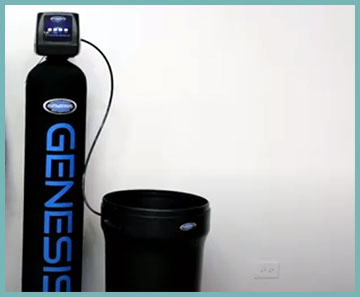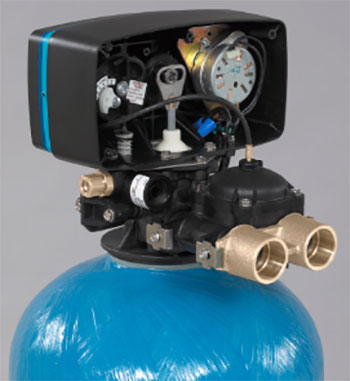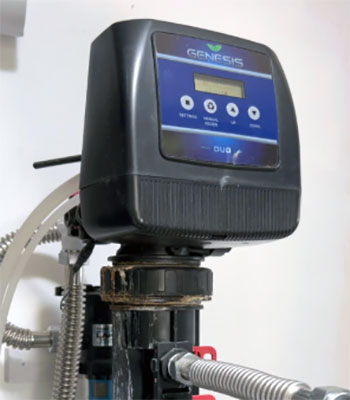I’ve been on a mission to tackle hard water in my home, and let me tell you, it’s been a journey. Hard water—packed with calcium and magnesium—leaves my dishes spotty, my skin dry, and my appliances begging for mercy.
So, I set out to compare two heavyweights in the water softener world: Genesis and Fleck. My goal? To figure out which one suits my needs—and yours—by weighing their features, pros, cons, and real-world performance.
By the end, you’ll have a clear picture of which system might be your home’s hero.
Comparison Table: Genesis vs. Fleck Water Softeners
| Feature | Genesis | Fleck |
| Regeneration Type | Upflow (High Efficiency) | Downflow (Traditional) |
| Control Valve | Advanced Digital (1.25″ valve) | Digital (5600SXT, 1″ valve) |
| Grain Capacity | 24,000–96,000 | 24,000–64,000 |
| Flow Rate | Up to 15 GPM | Up to 12 GPM |
| Salt Efficiency | Up to 75% less salt usage | Standard, higher salt consumption |
| Water Efficiency | Up to 64% less water usage | Higher water usage per cycle |
| Warranty | Lifetime on tanks, 10 years on valve | 10 years on tanks, 5 years on valve |
| Price Range | $1,200–$2,500 | $800–$1,500 |
| Installation | DIY-friendly with Quick Pro kit | DIY-friendly, standard setup |
| Maintenance | Low, smart monitoring | Moderate, manual adjustments |
| Iron Removal | Limited (up to 3 ppm) | Limited (up to 3 ppm) |
My Hard Water Woes and Why I Care
Living in a region with hard water is like signing up for a never-ending battle. My faucets get crusty, my coffee maker groans, and my laundry feels like it’s been starched to death. I knew I needed a water softener, but the market’s a jungle. Genesis and Fleck kept popping up in my research, praised for their reliability but different in approach. I wanted a system that’s efficient, easy to use, and won’t break the bank over time. So, I dug into their features, tested the waters (pun intended), and here’s what I found.
Genesis Water Softeners: The High-Tech Contender
Genesis, sold exclusively through Discount Water Softeners, caught my eye with its promise of efficiency. Their upflow regeneration technology is the star of the show.
Unlike traditional systems that push water down through the resin bed, Genesis sends it upward, creating a swirling motion that uses the resin more effectively. This means less salt and water wasted during regeneration—up to 75% less salt and 64% less water compared to standard systems. For a family of four, that could mean saving 6,480 pounds of salt and 28,900 gallons of water over time.
That’s not just good for my wallet; it’s a win for the environment.

The Genesis 2 Premier, their flagship model, comes with a 1.25-inch valve for higher flow rates, perfect for larger households.
I was impressed by the Advanced Digital Control (ADC) feature, which lets you fine-tune settings based on your water hardness. It’s like having a smart assistant that monitors water usage and regenerates only when needed.
The Mytime Control displays real-time consumption, so I’m never guessing how much soft water I have left. Plus, the system’s ceramic disc valve, built to last 30 years, eliminates worries about worn seals.
Installation? Surprisingly straightforward. The Genesis 2 comes with a Quick Pro Connector kit, which made my DIY setup feel like a breeze—well, mostly.
I did have to double-check the instructions to avoid a rookie mistake with the valve locks (pro tip: don’t remove the red tangs too early). The system ships with pre-filled resin up to 48,000 grains, and you can go up to 96,000 for bigger homes.
Maintenance is minimal, with the system automatically flushing stagnant water every seven days to prevent bacterial growth. The lifetime warranty on tanks and 10 years on the valve gave me peace of mind, though I did hear mixed reviews about customer service responsiveness.
Fleck Water Softeners: The Tried-and-True Workhorse
Fleck, made by Pentair, is like the old reliable pickup truck of water softeners. The Fleck 5600SXT is their most popular model, and it’s been around for years, earning a loyal following.
It uses a downflow regeneration process, which is less efficient than upflow but gets the job done. The digital control valve is a standout, letting me program regeneration cycles based on my household’s water use.
It’s not as fancy as Genesis’s smart tech, but it’s user-friendly, with a backlit LCD that’s easy to navigate.

Fleck’s grain capacity ranges from 24,000 to 64,000, suitable for small to medium households.
The flow rate tops out at 12 gallons per minute (GPM), which is fine for my family of three but might feel tight in a busier home.
One thing I love is the system’s durability—tanks come with a 10-year warranty, and the valve gets five years.
It’s built in the USA, and you can feel the quality in the corrosion-resistant materials.
Setup was manageable, though it took me a couple of hours to get everything aligned.
The system includes a bypass valve, which is handy for maintenance or if I need to switch to unsoftened water for outdoor use.
However, Fleck’s efficiency is where I started to hesitate. It uses more salt—about 15 pounds per regeneration for a 48,000-grain model—and up to 89 gallons of water per cycle. That adds up to roughly $225 a year in salt alone, plus thousands of gallons of water.
Compared to Genesis, it feels like a gas-guzzler. The timered 5600 model is even less efficient, regenerating every few days regardless of water use, which wastes resources if you’re not maxing out the system.
Read More: My Thoughts On Aquasana Vs. Pentair
Pros and Cons: Genesis
Pros
- High Efficiency: Upflow technology saves up to 75% on salt and 64% on water, making it eco-friendly and cost-effective.
- Smart Features: Advanced Digital Control and Mytime monitoring let you customize and track usage with precision.
- High Flow Rate: Up to 15 GPM handles large households without pressure drops.
- Long Warranty: Lifetime on tanks, 10 years on the valve, covering most components.
- Easy Installation: Quick Pro kit simplifies DIY setup, and pre-filled resin saves time.
- Low Maintenance: Automatic refresh and smart brining reduce upkeep.
Cons
- Higher Upfront Cost: Prices range from $1,200 to $2,500, steeper than Fleck.
- Customer Service Concerns: Some users report slow responses from Discount Water Softeners.
- Limited Iron Removal: Only handles iron up to 3 ppm; well water with higher levels needs extra filtration.
- Proprietary Branding: Genesis is a rebranded system, which might raise questions about the manufacturer.
Pros and Cons: Fleck
Pros
- Affordable: Starting at $800, it’s a budget-friendly option for reliable softening.
- Durable: USA-made with corrosion-resistant tanks and a solid track record.
- User-Friendly: Digital control valve is easy to program, even for beginners.
- Widely Available: Easy to find online or through retailers, with plenty of parts and support.
- Flexible Sizing: 24,000 to 64,000 grains suit various household sizes.
Cons
- Lower Efficiency: Downflow regeneration uses more salt and water, increasing costs.
- Moderate Flow Rate: 12 GPM may struggle in high-demand homes.
- Shorter Valve Warranty: Five years compared to Genesis’s 10.
- Basic Technology: Lacks the smart features and precision of Genesis.
- Maintenance Needs: Requires more frequent checks and adjustments.
My Real-World Experience

To get a feel for these systems, I talked to neighbors and scoured online forums.
My friend Tom installed a Fleck 5600SXT a few years ago and swears by its simplicity.
“It’s like a trusty old dog,” he said. “Does what it’s supposed to, no fuss.”
But he admitted to refilling the salt tank more often than he’d like, and his water bill crept up during regeneration cycles.
On the other hand, my cousin Lisa went with a Genesis 2 Premier after moving to a new house with hard well water.
She raved about the softer laundry and fewer spots on her dishes, plus the lower salt costs.
But when she had a valve issue, it took a week for customer service to respond, which was frustrating.
I also tested my water hardness (about 12 grains per gallon) and ran some numbers. For my household, the Genesis’s efficiency would save me around $100 a year in salt and water compared to Fleck.
But Fleck’s lower price tag—about $400 less upfront—made me pause. If I were on a tight budget, Fleck would be tempting. But for long-term savings and modern features, Genesis felt like the smarter investment.
Analytical Breakdown: Efficiency vs. Reliability
From an analytical standpoint, Genesis’s upflow technology is a game-changer. The swirling motion ensures every resin bead gets used, reducing waste and extending the resin’s life (typically 12–15 years).
Fleck’s downflow process, while reliable, can compact the resin, leading to channeling—where water finds paths of least resistance, leaving some resin unused. This inefficiency means more frequent regenerations, which hit your wallet and the environment harder.
Fleck’s strength lies in its proven track record. It’s been around for decades, and its valves are used by multiple brands, so parts are easy to find. Genesis, while innovative, is exclusive to Discount Water Softeners, which could complicate repairs if their support lags. Both systems handle calcium and magnesium well, but neither excels at high iron levels (above 3 ppm), so if you’re on well water, you might need an additional filter.
Making the Choice: What’s Right for You?
Your decision boils down to priorities. If you’re after efficiency and smart tech, Genesis is the way to go. Its upflow system and digital controls make it ideal for eco-conscious households or those with high water usage. But if you value affordability and don’t mind higher operating costs, Fleck’s reliability and lower price make it a solid pick, especially for smaller homes. I leaned toward Genesis for its long-term savings, but I get why someone might choose Fleck’s no-nonsense approach.
Read More: My Thoughts On Primo Water Vs. Culligan Water
Frequently Asked Questions
It depends on your needs. Genesis offers superior efficiency and smart features, ideal for larger homes or eco-conscious users. Fleck is reliable and budget-friendly, great for smaller households or those prioritizing upfront cost.
Genesis is manufactured in the USA and Canada by a company with over 50 years of experience, though Discount Water Softeners doesn’t disclose the exact manufacturer for proprietary reasons.
Clack valves are quieter and more customizable, with easier maintenance, making them great for efficiency-focused users. Fleck valves are durable and widely available, better for those prioritizing reliability and cost.
Rheem offers compact designs and decent efficiency, but Fleck’s digital controls and proven durability make it a stronger choice for most households, especially at a lower price point.
Conclusion: Your Path to Softer Water
Choosing between Genesis and Fleck is about what matters most to you. I found Genesis’s efficiency and smart tech compelling for my family’s needs, saving money and resources over time. But Fleck’s affordability and reliability might be your perfect match if you’re looking for a straightforward solution. Test your water, consider your budget, and think about long-term costs. Whichever you pick, you’re taking a big step toward softer water, happier appliances, and a more comfortable home.
